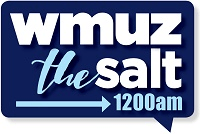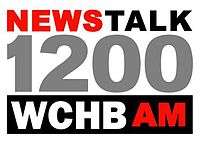WMUZ (AM)
WMUZ is an American AM radio station licensed to Taylor, Michigan, at 1200 kHz, and serving the Metro Detroit market. Owned by Crawford Broadcasting, the station has an inspirational format.[3]
 | |
| City | Taylor, Michigan |
|---|---|
| Broadcast area | Metro Detroit |
| Frequency | 1200 kHz |
| Branding | WMUZ The Salt 1200 AM[1] |
| Programming | |
| Format | Inspirational[2] |
| Ownership | |
| Owner | Crawford Broadcasting (WMUZ Radio, Inc.) |
| Sister stations | WMUZ-FM, WCHB, WRDT |
| History | |
| First air date | February 22, 1990 |
| Former call signs | WCHB (1990-2017) |
| Call sign meaning | Taken from sister station WMUZ-FM (103.5) |
| Technical information | |
| Licensing authority | FCC |
| Facility ID | 4598 |
| Class | B (regional) |
| Power | 50,000 watts (day) 15,000 watts (night) |
| Transmitter coordinates | 42°09′24″N 83°19′56″W |
| Links | |
| Public license information | Profile LMS |
| Website | wmuzam1200 |
The station's studios and offices are located near Burt Road and Capitol Avenue in the Weatherby section of Detroit, while its transmitter is in Romulus. WMUZ is a Class B station operating on the clear-channel frequency of 1200 AM; WOAI in San Antonio, Texas is the dominant Class A station on 1200 AM.
WMUZ uses a four-tower array during daylight hours and a ten-tower array during nighttime hours.
History
AM 1440 WCHB
The WCHB call letters date back to 1956, when the station signed on as a 1,000-watt daytimer at 1440 on the AM dial licensed to Inkster, Michigan. The call letters stood for Dr. Wendell Cox and Dr. Haley Bell, who owned and operated the station under the Bell Broadcasting banner.
WCHB was one of the earliest radio station in the United States to be built from the ground up by black owners, and with an R&B format, quickly became a visible presence in Detroit's black community. Early on, WCHB aimed to be an all-purpose full-service station for Detroit's African-American community, featuring not only R&B hits, but also gospel music, jazz, talk shows, and even a "Tweeny Time" show for two-to-six-year-olds. By the late 1960s, however, the popularity of the Motown sound, in addition to competition from WJLB (then an AM station at 1400 on the dial, now WDTK) and FM upstart WGPR, led WCHB to adopt a more Top 40-style presentation to the soul format. Locally owned for many years by Bell Broadcasting, WCHB signed on an FM sister, 105.9 WCHD, in 1960, which later changed its calls to WJZZ and became Detroit's most popular jazz station. 105.9 is still co-owned with the AM station by Radio One as WDMK.
WCHB experimented with a disco-based format for a time during the late 1970s and early 1980s. However, WCHB saw its ratings sink during the 1980s as FM urban contemporary stations like WJLB (which moved its format from the AM to the FM dial in 1980) and WDRQ grabbed much of its audience. The station eventually returned to its roots of being a full-service voice for the African-American community.
AM 1200 WCHB
The WCHB calls moved to their current home at 1200 kHz in February 1990 as a new AM station for the Metro Detroit area[4] and owned by Bell Broadcasting. AM 1440 moved into a gospel format as WMKM.
In 1998, Bell Broadcasting sold WCHB and WCHB-FM (formerly WJZZ, later WDTJ and now WDMK) to Radio One. Radio One then set about the process of upgrading WCHB's signal, which involved taking the station off the air for several months in August 1998 to upgrade the equipment and purchasing WKNX in Frankenmuth (at 1210 AM) and moving it to Kingsley, near Traverse City in northern Michigan (see also WLDR and WJML), to allow the 1200 AM signal to upgrade. Another occurrence which played a role was the nighttime reduction in power of first-adjacent channel WOWO in Ft. Wayne, Indiana (at 1190 AM). WOWO also directionalized its nighttime signal towards the west and became a Class B station (formerly a Class A, clear channel with good nighttime coverage of Metro Detroit). That change of the WOWO signal at least partially allowed WCHB to increase nighttime power to 15,000 watts from 700 watts.
WCHB resurfaced in March 1999 with a new 50,000-watt daytime/15,000-watt nighttime signal and with a format of mainly gospel music, with a morning talk show, "Inside Detroit," hosted by outspoken Detroit personality and former WJLB newscaster Mildred Gaddis.
NewsTalk 1200 WCHB
In April 2005, WCHB cut back its gospel programming to 9 p.m. to 6 a.m. weekdays and around the clock on weekends to make way for Radio One's syndicated lineup.
Beginning on January 30, 2006, Radio One debuted Syndication One, a joint venture of Radio One and REACH Media which featured urban talk show hosts Reverend Al Sharpton, Michael Eric Dyson and Doug & Ryan Stewart – the 2 Live Stews sports show. Mildred Gaddis' "Inside Detroit" remains a part of the schedule and airs from 6-10 a.m. weekdays. Another local show, "Your Voice with Angelo Henderson," hosted by Wall Street Journal columnist Angelo Henderson also airs weekdays from 10 a.m.-1 p.m.
The shows were also simultaneously placed on other Radio One stations, including WILD 1090 in Boston, WOL 1450 in Washington, DC., WVCG 1080 in Miami, WERE 1300 in Cleveland and WROU 1240 in Richmond, Virginia. Cox Radio's Birmingham station, WPSB 1320, also picked up each of the shows.
In March 2007, Michael Eric Dyson left the show and Syndication One. He was replaced by The Warren Ballentine Show, hosted by attorney Warren Ballentine, who refers himself as The People's Attorney and radio Truth Fighter.
On April 30, 2007, WCHB welcomed Parker & the Man to the weekly line-up. The show, hosted by sports journalist Rob Parker and broadcaster Mark Wilson. Parker is a columnist for the Detroit News and a regular contributor on ESPN2's First Take. Wilson is a former Associated Press and Michigan Association of Broadcasters' "Michigan Sportscaster of the Year." Parker & the Man, who were previously heard on Detroit FM station Live 97.1 WKRK, initially ran from 9 p.m-12 a.m. They were consistently among the top shows with men 25-54 while at WKRK, which is now known as 97.1 The Ticket.
In the fall of 2007, after the 2 Live Stews syndication deal was not renewed by Syndication One, Parker & the Man shifted to 4-7 p.m.
In June 2008, Parker and The Man was dropped from the station.
Gospel goes full time on AM 1200
On June 9, 2008, at 10 a.m., News-Talk AM 1200 flipped formats to a full-time gospel music station. Of its News-talk line-up, only morning host Mildred Gaddis remained with the station, continuing her morning drive show. She was the only live host on the station; after her show, the station became automated. WCHB was known as AM 1200 WCHB, Mildred In The Morning and Inspiration All Day.
Return of NewsTalk 1200
In 2009, WCHB reimaged itself as a News/Talk station again after failing to attract listeners with its Gospel format (the format was later relaunched in October 2011, this time on sister station WHTD). Gaddis remained in mornings, followed by Henderson, the syndicated Shapton, Ramona Prater's "F Club Radio Show" (a program geared towards a female audience), and Gayle King. Both Gaddis and Sharpton's shows are repeated after 8PM on weekdays.
On October 15, 2011, WCHB moved an FM repeater station, W206BI, from 89.1 to 99.9 FM (becoming W260CB) and began testing on that frequency. W206BI/W260CB was a translator of Toledo's National Public Radio affiliate, WGTE-FM, owned by the Bell Broadcasting Company (owned by Haley Bell, former co-owner of WCHB), and licensed to Hamtramck at 89.1 FM, with an application to move up to 99.9 and repeat WDMK-FM. W260CB is now on the air permanently; technically, the station repeats WDMK-HD2 105.9 FM, which was a slightly delayed simulcast of WCHB.[5] W260CB broadcasts with a power of 250 watts and an antenna of 245 meters.
During the summer of 2012, WCHB added smooth jazz programming during the late evening and overnight hours, restoring the format to the Detroit area on a part-time basis. Programming is from Broadcast Architecture's Smooth Jazz Network.
On April 12, 2017, Radio One announced that WCHB would be sold to Crawford Broadcasting.[6][7] At the same time, the company also stated that much of WCHB's programming will move to WPZR.[8] Also with the sale, translator W260CB was retained by Radio One, and currently simulcasts WDMK's HD2 sub-channel airing a classic soul format as "Soul 99.9."
As of June 23, 2017, the music portion of WCHB's programming consists of Motown and classic soul music.
On August 3, 2017, WCHB went silent after the sale of the station to Crawford was completed. On October 1, 2017, WCHB changed their call letters to WMUZ (the WCHB calls were moved to 1340 AM, formerly WEXL).
According to a Crawford Broadcasting engineering newsletter, WCHB is undergoing upgrades and will return to the air November 1, 2017.[9][10][11][12]
Previous Logo

See also
References
- https://crawfordbroadcasting.com/Local_Oscillator/November%202017%20Local%20Oscillator.pdf Page 4 of November Oscillator
- http://www.insideradio.com/free/the-salt-added-to-crawford-s-detroit-christian-cluster/article_5117e594-c89d-11e7-88b5-f343dc9cdb39.html
- https://www.allaccess.com/net-news/archive/story/171490/crawford-broadcasting-adds-wmuz-a-the-salt-detroit
- http://www.americanradiohistory.com/Archive-BC-YB/Broadcasting-1989-Yearbook-Page-Range-Guide.htm
- http://www.hdradio.com/stations
- http://www.crainsdetroit.com/article/20170412/NEWS/170419940/radio-one-detroit-oks-deal-to-sell-wchb
- http://www.insideradio.com/features/deal_digest/deal-digest---august/article_d94fc146-7d81-11e7-894e-3302af2afddc.html
- http://www.urbanradionation.com/2017/04/radio-one-sells-detroit-heritage.html Mildred Gaddis moves to the FM dial
- https://crawfordbroadcasting.com/Local_Oscillator/August%202017%20Local%20Oscillator.pdf Oscillator Pages 1 & 2
- https://crawfordbroadcasting.com/Local_Oscillator/September%202017%20Local%20Oscillator.pdf Oscillator Page 4
- https://crawfordbroadcasting.com/Local_Oscillator/November%202017%20Local%20Oscillator.pdf Oscillator Pages 1 & 2
- https://crawfordbroadcasting.com/Local_Oscillator/October%202017%20Local%20Oscillator.pdf Oscillator Pages 5 & 6
External links
- WMUZ in the FCC's AM station database
- WMUZ on Radio-Locator
- WMUZ in Nielsen Audio's AM station database